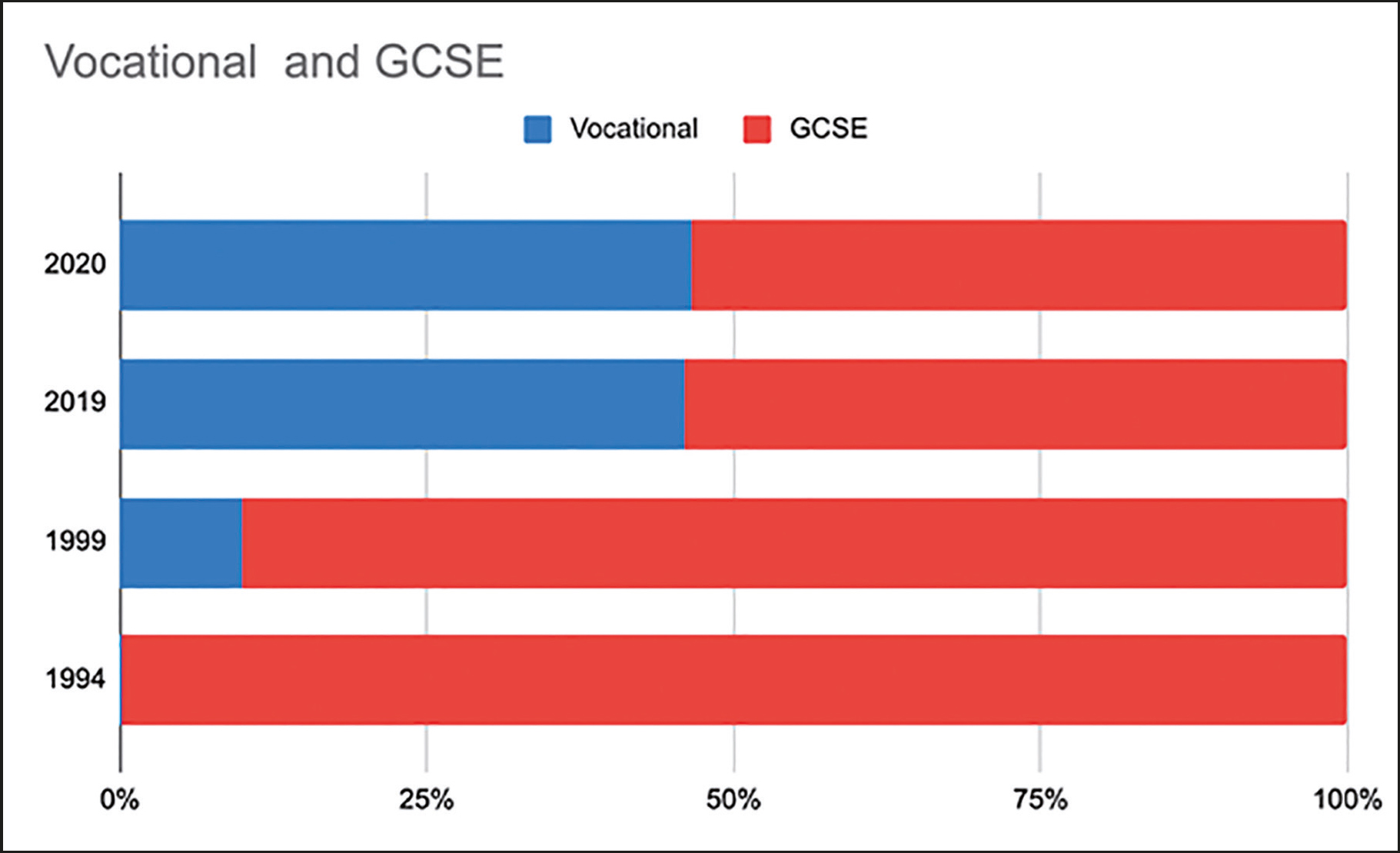
There is no denying the decline of GCSE numbers of Key Stage 4, which respected scholars and music teaching professionals have much debated over the last decade. This debate is ongoing and vital for our much-loved subject to grow and develop positively. However, the complete picture of the state of the nation’s young musicians is still being determined due to the rising acceptance and take-up of vocational music courses, which have been steadily growing since their inception in 1994.
The introduction of vocational courses was designed to ‘serve a far wider and less economically and educationally advantaged cohort of students’, according to Norton York, founder of the Rockschool Limited vocational courses. By this reckoning, the GCSE approach could be seen as exclusive, outdated in its content and irrelevant to today’s students.
Changing emphasis
In 1994, when the vocational course was introduced, just 83 people in England obtained a BTEC vocational music qualification, and nearly 37,000 received a Music GCSE. But now, looking at the wide range of musical qualifications available from exam boards such as Pearson, ESL, UAL and NCFE, it appears that vocational courses are becoming the teacher’s choice for their students, with close to 40,000 students studying them across Key Stages 4 and 5. The numbers continue to grow year on year despite the recent Ofqual reform of vocational qualifications, which makes it harder to accredit vocational music qualifications that are league-table worthy – something that many curriculum leaders across the country are bound to by their schools’ structure.
 Credit: cloud.rslawards.com/shop/academic/norton-books
Credit: cloud.rslawards.com/shop/academic/norton-books
Data from Ofqual datasets, from Norton York: Pop Music Education in the UK, 1960–2020
It is fair to say that a stigma around vocational music has formed over the years, with vocational courses being viewed as less academically or musically challenging than the GCSE. However, the main elements which are assessed for these courses look like those for GCSE, with the main focus continuing to be on performance, composition and listening to music. So what is the difference? Mostly the hierarchical assessment criteria for the practical aspects (composition and performance), and the selection of music that is listened to and appraised.
The student voice
There is room for much more student choice in vocational courses, which give colossal potential for learning within the student’s real-life musical experience. Within the vocational setting, students are required to justify their choice of music and explore its cultural background and meaning, which is then presented as coursework. This forms part of a more extensive live ‘set’ that the student then performs, requiring a large range of skills needed for a professional performance. Arguably, this gives more depth than the GCSE requirement of recording a musical piece which is then assessed against criteria based on technical skill, accuracy and expression.
Questions about the musical content and curricula delivery are now possible thanks to a shift in social consciousness and awareness. Some instructors and students are increasingly criticising an outdated sense of what constitutes ‘musical knowledge’, admitting that the goal of music education is changing. Heading towards a more just structure for music education can only be a positive thing. The vocational courses available could allow for the curriculum to be repurposed and the experience to be more individual. This is done through challenging the power structures that control the curriculum and dispelling the notion that the GCSE delivers a more ‘academic’ experience.
Music’s integrity
It’s vital to avoid undervaluing the subject by attempting to meet specific musical standards required in a professional context (even though we know this happens). The assessment of a person’s musical accuracy, technical control and expression are vital parts of what it means to be a musician, and unfair comparisons undermine this. Music as a subject maintains its academic integrity through carefully handling both assessment and content, and this must remain the case. The alternative is that music gets dropped from the school’s curriculum because of the need for perceived rigour based on core musical abilities. What those musical qualities are, I feel, may change over time.
A happy medium is yet to be found between these two different courses, and it remains our duty as educators to comprehend the significance of this choice for individual students in our care. The decision will undoubtedly shape the experiences and identities of students. Giving teachers and students the tools to be critical of the problems within music education is a fantastic place to start.








